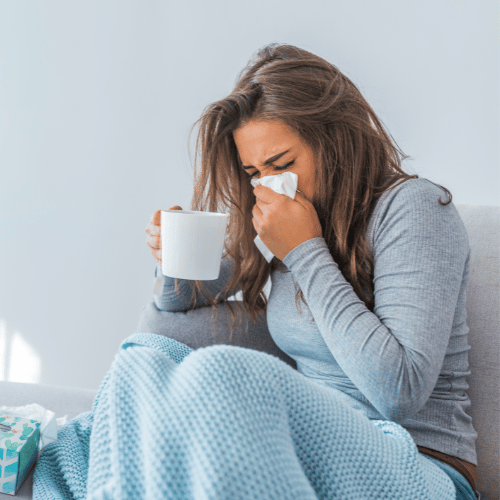
From Marathon Runner to Chronic Knee Pain
This is Tony’s story. He came to us with ongoing knee pain that worsened at work.
Conditions > Cold
A cold is a common viral infection that affects the nose, upper airways, throat, and sinuses.
It is caused by one of over 200 viruses, with rhinoviruses being the most prevalent, and is typically spread through droplets released via the coughs or sneezes of an infected person.
While it is generally mild, a cold can still make you feel under the weather and disrupt your daily activities.




Cold symptoms typically appear a few days after exposure to the virus, with typical symptoms being:
Preventing a cold involves maintaining good hygiene and adopting healthy habits. One effective practice is to use tissues when you cough or sneeze and dispose of them properly to prevent the spread of germs.
Regular handwashing with soap and water is crucial, especially after coughing or sneezing. It is also important to avoid close contact with individuals who are sick and refrain from sharing utensils or personal items.
Additionally, adopting a healthy lifestyle by maintaining a balanced diet, staying active, and getting adequate sleep can help strengthen your immune system and reduce your risk of catching a cold.


Your immune system plays a crucial role in combating colds. Maintaining a strong immune system can help you recover more quickly and reduce the frequency of colds.
To support your immune function, focus on eating a balanced diet rich in nutrients, which helps overall immune health. Regular physical activity is also important, as exercise can keep your immune system functioning optimally.
Managing stress is key, as high levels of stress can weaken your immune system and make you more susceptible to illness. Additionally, getting adequate sleep is essential, as quality rest is necessary for maintaining a healthy immune response.
Understanding the differences between colds, the flu, and allergies can help you manage your symptoms more effectively.
Colds are generally milder and are characterised by symptoms such as a runny nose, sore throat, and a mild fever.
In contrast, the flu is typically more severe, presenting with symptoms like a high fever, body aches, and fatigue.
Allergies, on the other hand, often involve itchy eyes, sneezing, and a runny nose but are not accompanied by fever or body aches.


The duration of a cold can vary from person to person, but most colds last between 7 to 10 days. Here is a general timeline of what to expect:
If symptoms persist beyond 10 days or worsen, it might be a sign of a more serious condition, and you should consult a healthcare professional.


Are you coming down frequently with the common cold? Our doctors can help with cold symptoms, recurrent colds, and advice for preventing future colds. Give us a call or use our online booking system to make an appointment.
We work with experienced consultants & healthcare professionals who have received positive feedback from our patients, and with whom we have established long-term relationships.
Use our online booking engine or book your test by giving us a call.
On the online booking engine select the “appointment type” you need.
You will be seen by one of our friendly doctors or trained clinicians.
Latest Episode
Tune in to our podcast to explore the world of healthcare and learn from distinguished special guests. We cover everything from preventative measures to cutting-edge treatments so that you can stay informed and up-to-date on health-related things.

This is Tony’s story. He came to us with ongoing knee pain that worsened at work.

A lot is said about medical weight loss but we are here to debunk the myths for you.

This is Kate’s story. She visited us last year and saw great improvements in her health and quality of life.
Subscribe for latest updates & news


From same-day private GP and blood test appointments to visa medicals, a sexual and reproductive health clinic, and preventative health screenings, we are here to help.
Contact Us
Accepted Insurance Companies






Please note that Walk-in Clinic is a private medical centre & not an NHS service. Harley Walk-in Clinic Ltd company registration no. 07472804